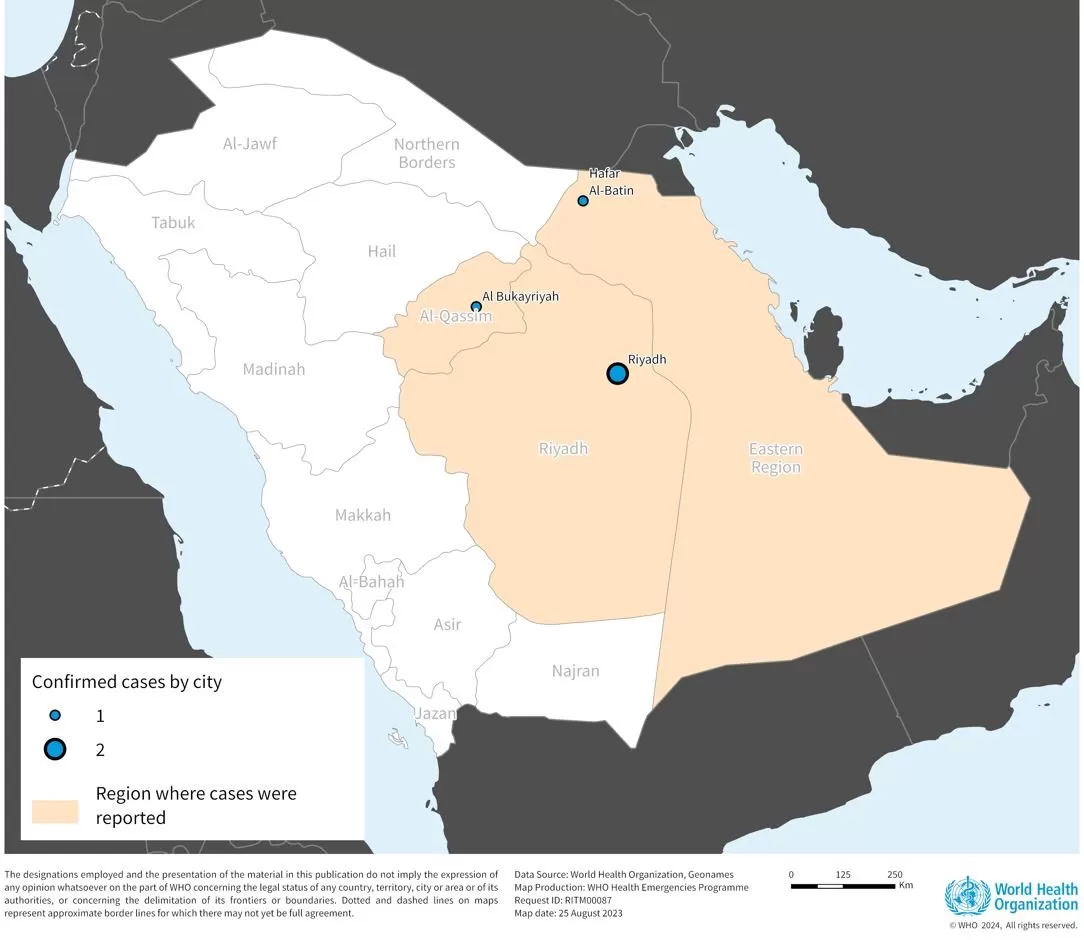Situation at a Glance
Description of the Situation
Between 13 August 2023 and 1 February 2024, the Ministry of Health (MoH) of the Kingdom of Saudi Arabia (KSA) reported four cases of Middle East respiratory syndrome coronavirus (MERS-CoV), including two deaths. The cases were reported from the Riyadh, Eastern, and Qassim regions of the KSA (Figure 1). Laboratory confirmation of the cases was performed by real-time polymerase chain reaction (RT-PCR) between 10 October 2023 and 16 November 2023.
All four cases had co-morbidities and none were health care workers. Two cases were male and two female, ranging in age from 59 to 93 years. The cases developed symptoms, including fever, cough, and shortness of breath, between 15 September 2023 and 26 October 2023. The two deaths occurred on 19 October 2023 and 24 December 2023.
Of the four cases, one was a camel owner, and another one had a history of indirect contact with dromedary camels as their family members were camel owners. For the other two cases, there was no clear history of exposure to known risk factors. None of them reported having a history of consumption of raw camel milk in the 14 days prior to the onset of symptoms. There are no known epidemiological links among the cases.
Since the first report of MERS-CoV in KSA in 2012, a total of 2200 human cases have been reported, including 858 deaths. Overall, human infections of MERS-CoV have been reported from 27 countries, in all six WHO regions. Of the 2609 MERS-CoV cases and 939 deaths reported globally, 84% and 91%, respectively, have been reported from KSA, including these newly reported cases and deaths. (Figure 2). Since 2019, no MERS-CoV cases have been reported from countries outside the Middle East.
Figure 1. Geographical distribution of MERS-CoV cases between 13 August 2023 to 1 February 2024 by city and region, KSA (n=4).

Figure 2: Epidemic curve of MERS-CoV cases (n=220) and deaths (n=858) reported in KSA between 2012-2024* 
Epidemiology
Middle East respiratory syndrome (MERS) is a viral respiratory infection caused by the MERS-CoV. Approximately 36% of patients with MERS have died, though this may be an overestimate of the true mortality rate, as mild cases of MERS-CoV may be missed by existing surveillance systems, and the case fatality ratio (CFR) is calculated based only on laboratory-confirmed cases.
Humans are infected with MERS-CoV from direct or indirect contact with dromedary camels, which are the natural host and zoonotic source of the virus. MERS-CoV has demonstrated the ability to transmit between humans. So far, non-sustained human-to-human transmission has occurred among close contacts and in health care settings. Outside of health care settings there has been limited human-to-human transmission to date.
MERS disease ranges from having no symptoms (asymptomatic) or mild respiratory symptoms, to severe acute respiratory disease and death. A typical presentation of MERS disease is fever, cough, and shortness of breath. Pneumonia is a common finding, but not always present. Gastrointestinal symptoms, including diarrhoea, have also been reported. Severe illness can cause respiratory failure that requires mechanical ventilation and support in an intensive care unit. The virus appears to cause more severe disease in older people, persons with weakened immune systems, and those with comorbidities or chronic diseases such as renal disease, cancer, chronic lung disease, and diabetes.
The number of MERS-CoV cases reported to WHO has substantially declined since the beginning of the ongoing COVID-19 pandemic. Initially, this was likely the result of epidemiological surveillance activities for COVID-19 being prioritized. The similar clinical picture of both diseases may result in reduced testing and detection of MERS-CoV cases. In addition, measures taken to reduce SARS-CoV-2 transmission (e.g., mask-wearing, hand hygiene, physical distancing, improving the ventilation of indoor spaces, respiratory etiquette, stay-at-home orders, reduced mobility) also likely reduced opportunities for onward human-to-human transmission of MERS-CoV. Potential cross-protection conferred from infection with or vaccination against SARS-CoV-2 and any reduction in MERS-CoV infection or disease severity and vice versa has been hypothesized but requires further investigation.
No vaccine or specific treatment is currently available, although several MERS-CoV-specific vaccines and therapeutics are in development. Treatment is supportive and based on the patient’s clinical condition and symptoms.
Public Health Response
For the two cases reporting direct and indirect contact with camels, the Ministry of Agriculture was informed, and an investigation of camels was conducted. The camels were found symptom-free, but no laboratory results of the animal investigation were shared with WHO. Dromedary camels infected with MERS-CoV may not show any signs of infection which makes it impossible to know if a camel or herd is infectious without doing laboratory tests. Preventive measures like good hygiene practices including strict hand washing before and after handling camels and heat treatment of camel products should therefore be implemented at all times.
WHO Risk Assessment
The notification of these four cases does not change the overall risk assessment, with the risk being moderate at both the global and regional level. The four new cases reported between 13 August 2023 and 1 February 2024 are believed to have acquired MERS-CoV infection locally and not to have transmitted it further.
WHO expects that additional cases of MERS-CoV infection will be reported from the Middle East and/or other countries where MERS-CoV is circulating in dromedaries, and that cases will continue to be exported to other countries by individuals who were exposed to the virus through contact with dromedaries or their products (for example, consumption of raw camel milk), or in a health care setting.
WHO continues to monitor the epidemiological situation and conducts risk assessment based on the latest available information.
WHO Advice
Based on the current situation and available information, WHO re-emphasizes the importance of strong surveillance by all Member States for acute respiratory infections, including MERS-CoV, and to carefully review and investigate any unusual patterns.
Human-to-human transmission of MERS-CoV in health care settings has been associated with delays in recognizing the early symptoms of MERS-CoV infection, delayed triage of suspected cases, and delays in implementing infection prevention and control (IPC) measures. IPC measures are critical to prevent the possible spread of MERS-CoV between people in health care facilities. Health care workers should consistently apply standard precautions consistently with all patients, at every interaction in health care settings.
Contact and droplet precautions, which includes the use of personal protective equipment (PPE) such as clean non-sterile gown, gloves, eye protection and medical mask, should be added to the standard precautions when providing care to patients with MERS-CoV. Airborne precautions should be applied when performing aerosol-generating procedures or in settings where aerosol-generating procedures are conducted. Early identification, case management and isolation of cases, quarantine of contacts, together with appropriate IPC measures in health care setting and public health awareness can prevent human-to-human transmission of MERS-CoV.
MERS-CoV infection appears to cause more severe disease in people with underlying chronic medical conditions such as diabetes, renal failure, chronic lung disease, and immunocompromised persons. Therefore, people with these underlying medical conditions should avoid close contact with animals, particularly dromedaries, when visiting farms, markets, or barn areas where the virus may be circulating. General hygiene measures should be adhered to, such as regular hand washing before and after touching animals and avoiding contact with sick animals.
Food hygiene practices should be observed. People should avoid drinking raw camel milk, contact with camel urine or eating camel meat that has not been thoroughly cooked. The consumption of raw or undercooked animal products, including milk and meat, carries a high risk of infection from pathogens that may cause disease in humans. Animal products that are processed appropriately through cooking or pasteurization are safe for consumption. Foods that have gone through these processes should be handled with care to avoid cross contamination with uncooked/unsafe foods. Camel meat and camel milk are nutritious products that can continue to be consumed after cooking, pasteurization or other thermal treatments.
WHO does not advise special screening at points of entry regarding this event, nor does it currently recommend the application of any travel or trade restrictions.
Further Information
- WHO, Middle East respiratory syndrome coronavirus (MERS-CoV) Fact sheet
- WHO, Middle East respiratory syndrome: global summary and assessment of risk – 16 November 2022
- WHO EPI-WIN Update 88: MERS-CoV, a circulating coronavirus with epidemic and pandemic potential – Pandemic preparedness, prevention and response with a One Health approach
- WHO EPI-WIN webinar: MERS-CoV, a circulating coronavirus with epidemic and pandemic potential – Pandemic preparedness, prevention and response with a One Health approach
- Middle East Respiratory Syndrome Outbreak Toolbox
- Middle East Respiratory Syndrome Overview
- WHO-EMRO MERS monthly bulletin
- MERS outbreak in the Republic of Korea, 2015
- Korea Disease control and Prevention agency, Middle East Respiratory Syndrome (MERS) outbreak in 2015
- Five keys to safer food manual
- World Health Organization (29 August 2023). Disease Outbreak News; Middle East respiratory syndrome coronavirus (MERS-CoV) – Saudi Arabia. Available at: https://www.who.int/emergencies/disease-outbreak-news/item/2023-DON484
Citable reference: World Health Organization (16 February 2024). Disease Outbreak News; Middle East respiratory syndrome coronavirus – Saudi Arabia. Available at: https://www.who.int/emergencies/disease-outbreak-news/item/2024-DON506











